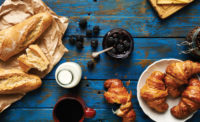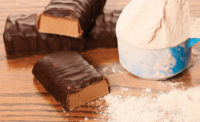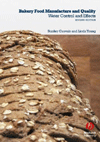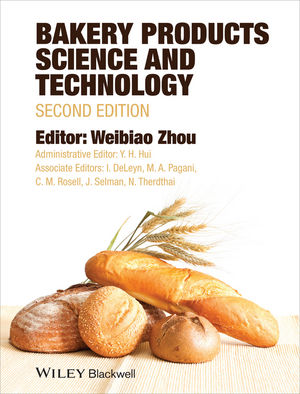It feels a little uncomfortable admitting it, but COVID-19 may actually yield a few upsides—or at least a few opportunities for snack and bakery brands to turn the pandemic’s lemons into lemon-flavored blondie bites.
For while the disease’s toll on lives, lifestyles, and the economy writ large strains the limits of what’s fathomable, it has kept a lot of consumers at home, snacking on familiar favorites and rediscovering their love of baked goods.
And, by all appearances, the baked goods and snacks they’re rediscovering are private label brands. Across retail, store brands grew 14.6 percent in dollar sales and 12.8 percent in unit volume during the first quarter of 2020—when the pandemic’s effects first descended—while sales and unit growth among national brands hovered around 11.5 percent and 9.2 percent, respectively, per Nielsen data provided to the Private Label Manufacturers Association (see “Nielsen first quarter numbers show growth of store brands as shoppers stock up during crisis”).
Such momentum may carry private label snack and bakery’s prospects even higher post-COVID. “With retailers increasingly using their private brands to lead with cost-effective and innovative solutions that address changing needs, they’ll effectively extend their brands’ reach and relevancy to drive growth,” says Bob DiNunzio, director of category solutions, Daymon, Stamford, CT.
Home base
These days, at-home eating is more relevant than ever—a phenomenon that none of us could’ve predicted as recently as half a year ago. But, given the constraints that COVID-19 imposed upon day-to-day routines, this thorough domestication of dining makes perfect sense in retrospect.
As DiNunzio explains, “With restaurants closed, cooking and consuming meals at home became the status quo, establishing the home as the epicenter of daily life.”
And it’ll likely remain as such for some time. DiNunzio notes that nearly 60 percent of consumers report they plan to eat at home more frequently post-pandemic, with only 25 percent aiming to resume old out-of-home dining habits. “So with these new eating behaviors set,” he says, “at-home food consumption will become more ubiquitous.”
Round-the-clock grazing on snacks and bakery has also gotten a lift courtesy of COVID-19’s restrictions.
Of course, snacking had already begun supplanting sit-down dining as consumers’ preferred way to fuel well before the coronavirus spread. But playing even further in snacking’s favor is the fact that by keeping consumers stuck at home, COVID-19 triggered a sort of “cocooning instinct” that sent them to their pantries in search of comforting treats to soothe anxiety and take the edge off the shelter-in-place stress.
The upshot: Salty snacks, candy, cookies, and crackers—what DiNunzio calls “go-to categories”—all saw significant growth during the disease’s early days, he says.
Brand-agnostic
But not all brands partook of that growth equally. “In particular,” DiNunzio says, “consumers turned to private bands to solve their snacking and comfort-food needs”—reflecting a “brand-agnostic” buying pattern that serves private label well.
Nick Scavo, bakery consultant, J.S.C. Services and owner, Nummies Bakery, Chester, NY, has noticed the shift, as well, and he attributes it to a handful of factors ranging from out-of-stocks among national brands to sheer panic at the supermarket. “No one knew how long this was going to last, nor how seriously it would affect our lives,” he recalls. “I look at it as the same way people behave before a hurricane or snowstorm.”
The Nummies production schedule has certainly been busier over the past five months, notes Scavo, as several smaller clients with whom he’d been discussing private label projects even before COVID-19 “all decided this was the right time to let someone else make their product,” he says. “All of their volume at retail has increased since the pandemic started, without exception.”
It’s the economy
Even though private label’s COVID-19 windfall may seem like the unexpected silver lining to this black cloud of a global event, the bounce wasn’t entirely atypical if you consider it in light of current economics.
“Given that we’re entering one of the largest economic downturns in history—with roughly one-third of U.S. families financially affected—the value and reliability of private brands may matter even more amidst mounting price sensitivities,” DiNunzio points out.
“If you track every recession going back, literally, 50 years, generally they give a bump to private brands early in the cycle based on pure economic need,” says Jim Wisner, owner and president, Wisner Marketing, Lake Forest, IL.
Scavo’s experience backs up the record. “As a contract manufacturer,” he says, “recessions typically help all my private label businesses because at those times, there are simply more people willing to try a new product if it’ll save them a few bucks.”
Behind-the-scenes boost
At many supermarkets—at least during the pandemic’s outset—private label snack and bakery options may have been the only ones available for consumers to try.
That’s because private label lines generally escaped the out-of-stocks and supply-chain glitches that plagued national brands over the pandemic’s first weeks, giving those house brands a chance to strut their stuff.
Retailers were able to avoid widespread shortages of their own brands simply by having more private label weeks of stock in the pipeline. “In terms of what manufacturers were producing, there was a better supply-chain situation for private brands, because private-brand retailers have so many stores,” says Wisner. “It’s just math.”
What’s more, when the national snack or baked good that consumers were looking for wasn’t available, brand loyalties held much less weight, says Wisner, generating increased private label trial. “So where consumers in the past might not have been willing to change from their favorite brand, they were now far more willing. There was a broader base in terms of what folks would buy.”
Finally, as consumers adopted online grocery shopping at more than double the pre-COVID rate, the dynamics of the online shelf also focused their attention on private brands.
“When I go to a brick-and-mortar store, I have 70,000 square feet and I’m looking at 100,000 different products,” says Wisner. “But if I go online, I have roughly 70 square centimeters, and I’m going to see, typically, one of three things in the retailer’s top rankings: a brand I’ve purchased before, a brand that paid to get that prime position, and what the retailer wants me to buy. And, in almost every case, that last one is going to be its private brand.”
Ride the wave
So even as COVID-19 decimated other sectors of the food industry, it set up ideal conditions for opening consumers’ eyes and minds to private label snacks and baked goods. But will those eyes and minds remain open once the virus is in the rearview mirror?
The economic argument says yes. History shows that recession-based bumps ultimately ratchet private label sales upward over time. “Sales don’t fall back to prior levels,” says Wisner. “Private brands have outgrown national brands for something like 17 out of the last 20 years—and one of those was a tie. So you get a bump that plateaus, but it resumes its growth rate from a higher level.”
The economic argument alone won’t win the day, though. So how can private label snacks and baked goods keep the momentum going even after “normal” returns? “Simple,” says Scavo. “Private labels needs to be good—not just cheaper.”
Reputation re-do
Fortunately, private label product quality is largely very good.
“Most private brands from any of the major retailers are at least very good, primarily because that’s what works,” says Wisner. “Quality is actually significantly more important than price with a private brand, because you’ve already won the price game.”
Chains like Trader Joe’s, Costco, and Safeway have raised the bar with private brand snack and bakery items that hold their own and even outperform national brands on sensory appeal. And that’s made it easier for consumers to choose private brands—and to share them—with pride.
This hasn’t always been the case. Not too long ago, a prevailing stigma surrounded some private brands, Scavo notes. But because of the aforementioned quality improvements, as well as a “chic to be cheap” ethos that’s made bargain hunting more culturally acceptable, the negative connotations have virtually evaporated.
Scavo even thinks social media has helped rehabilitate private label snack and bakery’s reputation. “People’s access to instant knowledge will help any good product,” he points out, “meaning that if a customer tries something they like and posts it on social media, it could have a tremendous effect on that product’s success.”
Give them what they want
DiNunzio acknowledges that national brands still lead in many snack and bakery segments. But Daymon research hints that the increased private brand trial we see today will lead to long-term conversion and loyalty, he says.
So DiNunzio suggests that retailers and their snack and bakery manufacturing partners continue courting consumers by giving them even more of what they want, including what he considers the two key trends impacting snack and bakery categories: health and wellness, and flavor exploration. “Taste remains the No. 1 driver of most snack purchases,” DiNunzio notes, which is why he believe it’ll continue to play a significant role in snacking innovation moving forward, especially within private brands.
That means brands will launch “more sophisticated” snack and baked-good profiles “influenced by culinary trends: multidimensional, multisensory, indulgent, and inclusive of global, as well as hyperlocal, cuisines,” says DiNunzio.
Wisner’s already seen chains boost private label snack sales by, among other initiatives, expanding variety. “So they’re not just carrying the basic chip anymore,” he says. “They’ve added the sea salt and vinegar flavor, the cracked pepper. And that’s been a significantly helpful move.”
Even better, DiNunzio says, is fusing flavor exploration with better-for-you as COVID-19 awakens consumers yet further to the importance of optimizing their health—even by way of smart snack and bakery choices.
In the potato and tortilla chip categories alone, DiNunzio says, 76 percent of consumers expressed interest in trying a new option if it was a healthier alternative. “And this is expected to continue as consumers search for bold flavors and health alike,” he says.
Yet consumers’ concept of what a “healthy” snack or baked good is itself is evolving from simply including less sugar or sodium to delivering tangible health benefits. “As snacking throughout the day becomes more mainstream,” DiNunzio adds, “consumers will look for higher-protein, nutrient-rich options as substitutes for traditional meals.”
Wisner points out that private brands “are really starting to carve out a niche”—particularly among snacks—in the clean-label space. “Private brand penetration on organic and better-for-you products is dramatically increasing, and that lifts the boat for everybody right now,” he says. Think Kroger’s Simple Truth, or Safeway’s O Organics and Open Nature lines—all of which have thrived by colonizing a niche with less of a national presence.
And don’t forget the cachet of the plant-based trend. “It’s amazing how quickly many retailers have come to market with their own plant-based items here,” Wisner says. It’s also a sign of how far private label has come from the days when it followed national brands’ lead—by a long distance.
“All that’s changing,” Wisner says. “As more people get exposed to private brands, try products, talk about them, and share their experiences with others, it feeds on itself.”












